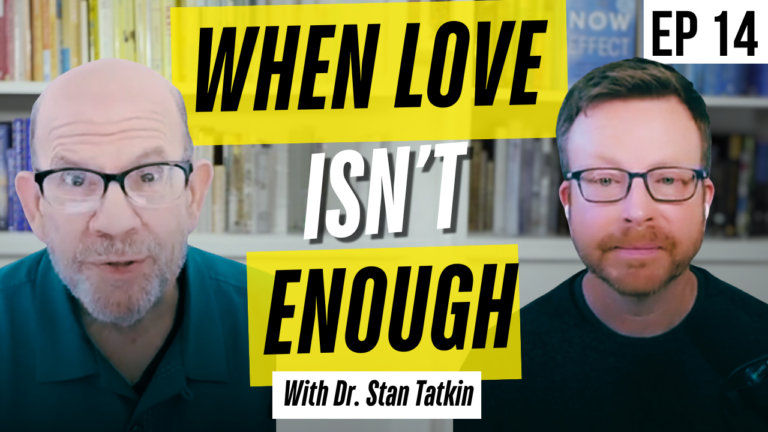
Personal Growth

Founder and Psychologist
by Dr. Elisha Goldstein
Relationships aren’t just about feelings—they’re about agreements, purpose, and learning how to protect each other from harm.” – Dr. Stan Tatkin
We Explore:
00:00 – Why Love Isn’t Enough
03:25 – We’re Wired for Co-Regulation
06:42 – The Problem with Self-Protection
12:00 – What Is Secure Functioning?
18:55 – The Biology of Attachment vs. Love
25:40 – How to Handle Conflict Without Escalating
33:20 – Becoming Your Partner’s Handler
39:10 – Preparing for Future Triggers
45:30 – Why Couples Don’t Plan for Disconnection
52:15 – The Power of Repair
57:40 – What a Relationship Actually Is
1:02:00 – The First Step to Start Healing Together
SHOWNOTES
Most of us grow up believing that love is the glue that holds a relationship together. But what if that’s not true? What if love alone isn’t enough to weather the storms of daily life, emotional stress, and long-term connection?
In this episode of The Emotional Longevity Podcast, I sit down with Dr. Stan Tatkin, renowned couples therapist, founder of The PACT Institute, and author of Wired for Love and In Each Other’s Care. His work reveals something we rarely talk about: that the success of a relationship doesn’t hinge on feelings – it hinges on systems.
According to Dr. Tatkin, the most connected, resilient couples don’t just talk about their feelings. They plan. They set agreements. They operate like a team, building emotional safety before stress takes them down.
Why Love Isn’t Enough
Stan shares that after the pain of a devastating divorce, he began studying what makes relationships thrive—or collapse. His conclusion? “We’re wired for connection, not isolation. But our survival instincts can sabotage us if we don’t have a shared purpose and governance in place.”
He explains that our nervous systems are constantly scanning for threat. Without mutual agreements about how to handle stress, differences, and emotional pain, couples will fall into cycles of self-protection and conflict.
“When stress hits, we stop being pro-relationship and become pro-self. Everyone does it. The key is having a system in place that keeps you working as a team—even under pressure.”
The Power of Planning, Predicting, and Protecting
In Dr. Tatkin’s model, the foundation of a strong relationship is built on three Ps:
Plan, Predict, and Protect. He uses examples like military units, dance troupes, or cop-car partners—teams that function well under pressure because they have a shared purpose and agreements in place.
“Couples don’t fail because they don’t love each other. They fail because they never made a plan for how to protect each other when things get hard.”
Stan encourages couples to treat their relationship as a survival unit – a shared invention that must be cared for and maintained, just like any important system. And this isn’t just about conflict. It’s about knowing the animal you picked – learning how your partner operates, and taking responsibility for helping them regulate under stress.
Emotional Health Starts With We, Not Me
Much of what Dr. Tatkin teaches aligns deeply with emotional health. The ability to notice your own dysregulation, to care for your partner in their most vulnerable moments, and to create a culture of repair over being right – these are not just relationship tools, they’re emotional longevity essentials.
“Secure functioning requires that I can tolerate pain without acting it out. That I can grieve losses, accept differences, and stay connected under stress.”
He reminds us that healing doesn’t happen by going it alone – it happens in connection. But that connection must be intentional, with clearly defined boundaries, shared purpose, and mutual accountability.
What This Means for You
Even if you’re not in a relationship right now—or if you’re in one that feels a little disconnected—there are takeaways you can apply immediately:
✅ Shift From “Me” to “We” – Ask: What’s our purpose? What are we building and protecting together?
✅ Practice Repair – Instead of defending your point, try saying: “I care more about us being okay than being right.”
✅ Prepare, Don’t Just React – Talk in advance about recurring stressors so you’re ready when they arise.
✅ Co-Regulate in Real Time – If your partner is dysregulated, your calm presence can be the thing that brings them back to safety.
Final Thoughts: Build the Relationship You Want
What Stan makes clear is this: relationships that last don’t happen by accident. They’re built with care, clarity, and intention.
If you’re ready to move beyond “love is enough” and step into a relationship that’s truly secure, collaborative, and emotionally resilient, this conversation is a must-listen. And if you’re in a partnership, take this opportunity to ask each other: What are we building, and how do we want to protect it – together?
Want to Go Deeper?
Uncover the Power Within isn’t just a coaching program, it’s a supportive space to strengthen emotional resilience and build meaningful connection. With the support of a trusted community and science-backed guidance, you’ll learn how to regulate your nervous system, reduce overwhelm, and create more emotionally safe, fulfilling relationships—starting with the one you have with yourself.
If you’re ready to live with more intention, clarity, and connection, schedule a call with me to explore what’s possible.
Subscribe to The Emotional Longevity Podcast for more conversations that inspire personal growth, emotional resilience, and thriving relationships.
If this episode resonated with you, consider sharing it with someone who may be feeling disconnected or navigating relationship challenges. It might be the reminder they need – that healthy love isn’t about perfection, but about presence, repair, and learning to grow together. They can listen to this episode of The Emotional Longevity Podcast or read this blog.
Take care of yourself – and remember, every strong relationship starts with emotional awareness, compassion, and a willingness to show up.